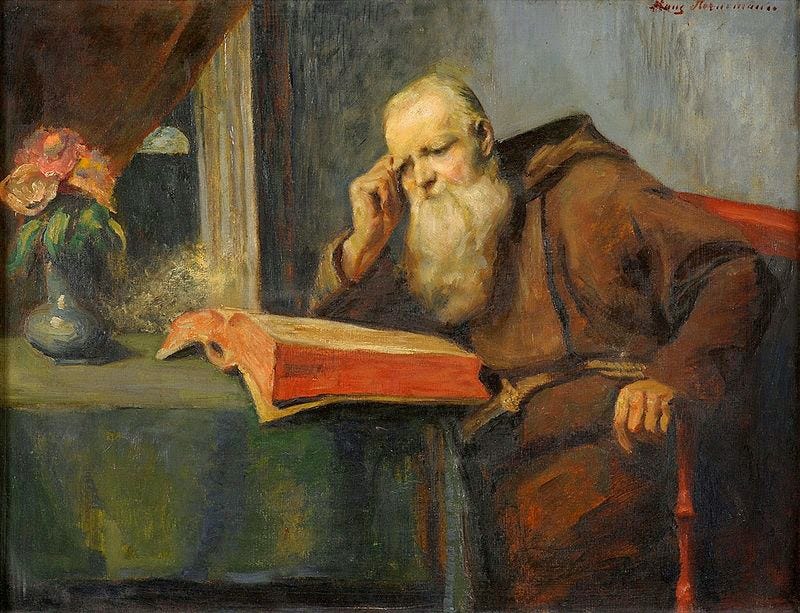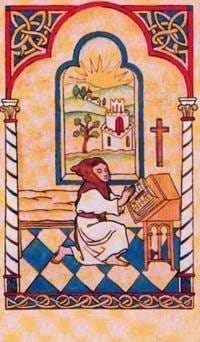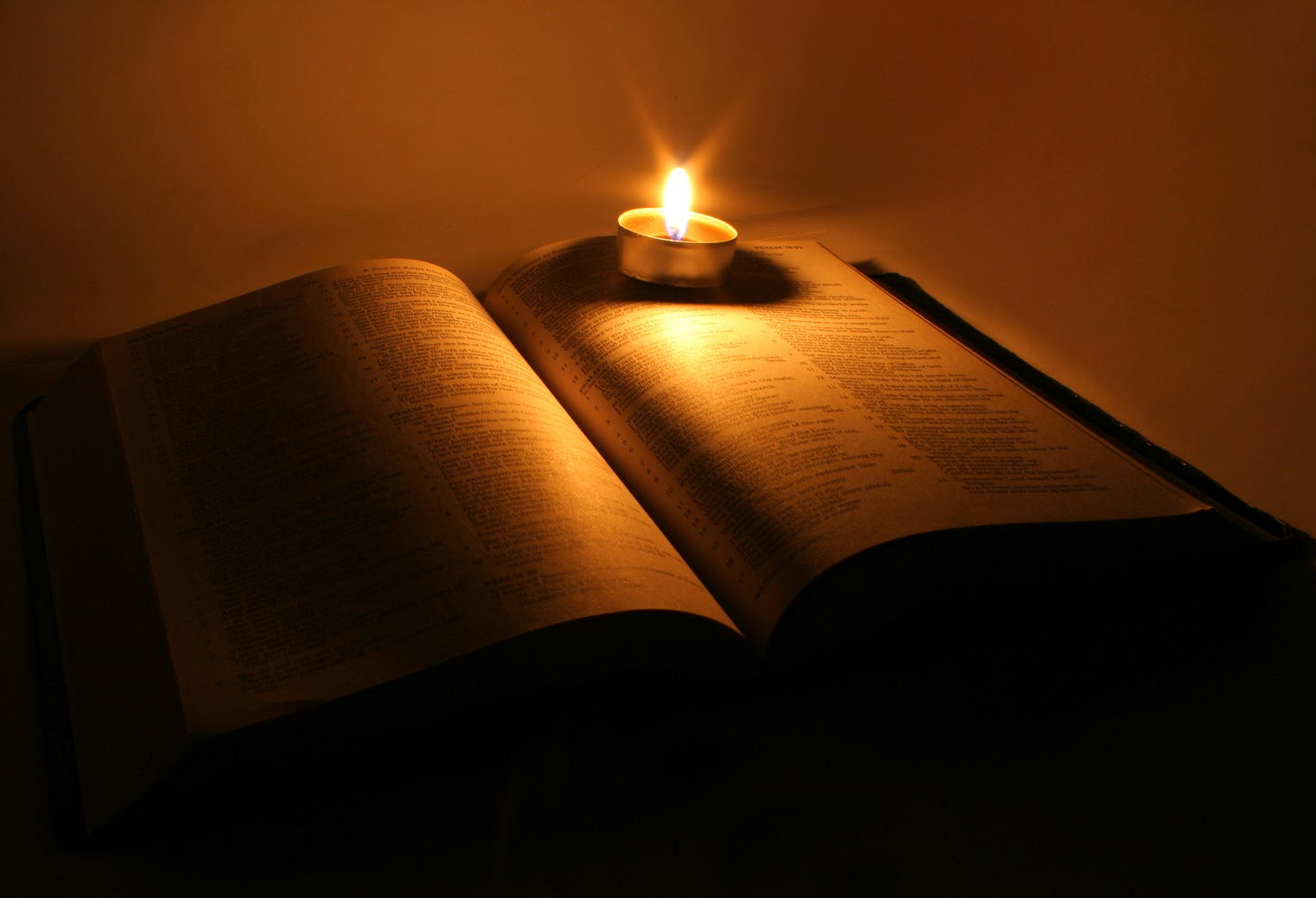The Gift of Reading Scripture
The finite words of Scripture contain the infinite mind of Christ. We need to read and pray them every day.
I’ve received good things in each part of the Christian world I’ve been in, want to acknowledge that despite differences we may have. In the Evangelical world, I received the great good of learning to read and pray the bible. Little did I know I was embarking on a long tradition of scripture reading, memorization and prayer going back to the time of the earliest Christians and desert hermits, spreading around the Christian world and enduring centuries of tumult up to my own day, when a bible and a reading plan were placed in my hands.
This post is second in a series. Click here to read the first.
If there is one outstandingly good thing I gained in the Evangelical world and have carried with me everywhere since, that I don’t think I would have gained nearly so well anywhere else (for reasons I will explain), it is the necessity of reading and praying the bible, cover to cover, again and again, over the course of your life.
My first church, an Evangelical church (thankfully a very good one with solid leadership), had a 12-week class for new Christians in which we learned the basics of our faith. One of them was about the bible, the need to read and study it daily, cover to cover, and to memorize verses of scripture that speak to you so you can remember and repeat them to yourself throughout the day.
In class we were given a one-year bible reading plan, short daily readings taken from the Old Testament, Psalms, and New Testament, with little checkboxes next to each set of readings. And we were challenged to go through and complete it.
Thankfully, the Protestant world provides an abundance of study bibles, without which the bible can be hard to read and understand. (Something the Catholic Church has been struggling to catch up with, though still far behind, and the Orthodox Church is only just beginning to get into, due to accidents of history I’ll explain as I go along).
The Ancient Tradition of Reading Scripture
I did not know it at the time, but I was beginning to engage in the ancient tradition of the early and undivided Church of the first 1000 years, handed on by hermits, monks and saints East and West. Reading, praying, and memorizing scripture was fundamental to the lives of the early and unified Christians of the pre-schism Church.
They did not have bound, printed bibles as we do today, but the first followers of Christ had the Old Testament scriptures, which Jesus explained the meaning of beginning on the Road to Emmaus, showing how they were about Him. Over time the apostles wrote the gospels and letters of the New Testament, which were assiduously copied by hand and distributed to Christians everywhere.
Not all Christians knew how to read prior to the invention of the printing press, that was the domain of elites who had money to pay for teachers and reading materials. But unlike the modern world where information is available at the click of a mouse or touch of a screen, they had strong, well-developed memories and sense of hearing.
People remembered well what they heard read in church, and verses of scripture were given to those who couldn’t read so they could memorize and repeat them to themselves throughout the day. Hermits and monks memorized and repeated verses to themselves while working as a way of praying without ceasing (what led to the development of the Jesus Prayer popular in the Orthodox world today). In fact, repeating memorized scriptures to oneself was itself considered reading, not only reading with the eyes.
Early hermits and monks memorized all the psalms, and some memorized the entire bible. Monastic communities as they developed taught reading to their members, so they could read and pray the scriptures; that was a special focus of St. Benedict of Nursia in the West, who drew his inspiration from the Eastern monastics and desert hermits. Monasteries became centers of hand-copying scriptures in beautiful calligraphy with illuminated borders, copying scripture considered the highest form of manual labor and extremely sanctifying. In time, after the books of the bible were canonized, they began producing beautiful whole hand-bound bibles for use in churches and cathedrals.
The writings of the Early Church Fathers, the teachers of the Faith who followed in the footsteps of the apostles, are steeped in scripture, and they stressed the importance of reading and praying scripture. In the fourth century St. John Chrysostom, one of the greatest Eastern saints and Fathers of the Church, whose Divine Liturgy is the principle service celebrated in Orthodox Churches around the world to this day, chastised those who had scriptures in their homes yet never read them, stating they are a source of sanctification that attracts the Holy Spirit, sanctifies soul and body, heals the passions, and drives away evil (Commentary on St. John the Apostle, Homily 32).
As the gospel spread and the Church grew, scriptures were translated into different languages, Syrian, Arabic, Latin, etc., so people in different regions could read or hear them read in their own language. In the ninth century saints Cyril and Methodius invented the Slavic alphabet so they could translate the scriptures for the Slavic people.
Decline in Reading
Unfortunately, the passage of time brought divisions, principally the Great Schism between East and West in 1054, and later the Protestant Reformation in the West.
In the West, though short-lived as a living language, Latin had become predominant. It was the language of ecclesiastics, the bible, and cosmopolitan elites, though less of the common people, as over time languages developed regionally into the different European languages, Italian, Spanish, German, French, etc.
By the 15th century there was a movement to begin translating scripture into the local vernacular on the European continent. But in England an incipient heresy was emerging (Lollardism), in part based on interpretations of scripture that differed from Catholic interpretations and challenged the authority of the Church and priesthood.
Out of fear of heresy, the English Catholic Church made reading or even hearing scripture read in English a heresy punishable by execution. (A historical aside, execution of heretics was condemned in the pre-schism Church East and West, including very publicly by the great Latin Father St. Ambrose of Milan. It was employed by the Catholic Church only after schism with the East, but never by the East.) The English people resisted, English bibles were translated in Europe and smuggled into England, and over time hundreds of poor and ordinary English men and women were arrested when caught with them or when listening to someone else read them, executed by hanging or burning at the stake.
This was a serious precursor to the Protestant Reformation. And martyrdom led to even greater zeal to translate the bible, a work that exploded around the globe after the invention of the printing press.
Unfortunately, it led to a contraction of reading the bible in the Catholic world, never formally condemned by the Catholic Church (an English translation was produced around the same time as the King James, the Douay Rheims), but still discouraged for the laity out of fear of misunderstanding and heresy, a problem that lasted into the 20th century.
The Orthodox
The Orthodox were dealing with a different set of problems. The centuries of peace in the Byzantine Empire gradually crumbled with the rise of Islam, region after region overtaken by Muslim invaders, formally Christian lands converted to Muslim nations, Christians subjugated and impoverished, their numbers reduced, sons taken, castrated and made to serve in Muslim armies and courts, daughters taken for Muslim harems.
The Catholic Crusades brought problems too, the worst being the sack of Constantinople by mercenary crusaders in 1204. That combined with the Catholic tendency to install Latin bishops in Orthodox lands, the occasional refusal of the Catholic Church to help the East against Muslim invaders, and after schism the Vatican raising its own armies that were sometimes used against the Orthodox, resulted in lasting hostility toward the West. (Another aside, in the pre-schism Church emperors and kings raised armies, but never the Church, a practice maintained in the East. But in the West, like execution of heretics, the Pope began raising his own armies soon after schism with the East).
The rise of atheistic communism, which overtook traditionally Orthodox countries in Russia and Eastern Europe, resulted in the deaths of millions of Orthodox lay people, priests and monastics, and the widespread near-total destruction of bibles, Orthodox books and thousands of churches and monasteries. The Orthodox faith was kept alive only in careful secrecy by survivors. Some outwardly ordinary men, including members and officers of the communist party, were secretly Orthodox and ordained as priests and bishops, so they could secretly catechize and baptize others, at risk of their lives. Much like early Christians in the court at Rome during the pagan Roman persecutions.
For many Orthodox Christians, the only way to learn their faith was by attending the Divine Liturgy (the Orthodox worship service) in secret, as there were no bibles or books to learn from. Many had to travel to find one, so could attend only rarely. A friend of mine has told me stories about how she and her mother would travel to one when she was a child, and how dangerous it was if discovered.
Which means reading and praying the bible in Orthodoxy also became rare, Orthodox people unaccustomed to it. In the US, Orthodox immigrants are relative newcomers, smaller in number and with fewer resources compared to other churches, due to the impoverishment and hardship they’ve been through. (For that reason, we Western Christians accustomed to religious freedom and easy access to resources need to be understanding of the Orthodox and what they’ve been through).
A few, confronted with the unaccustomed religious freedom and Christian diversity of the West, have even become fearful and discouraging of reading the bible, or of reading non-Orthodox translations of the bible, for fear of misinterpreting and leaving Orthodoxy for a different church, reminiscent of how the Catholic Church had been.
Recovery East and West
Thankfully, Orthodoxy is being discovered in the West (as well as recovering in formerly communist countries), and Westerners converting. Many converts bring their love of scripture into Orthodoxy, and some parishes now have bible studies (my pastor leads one in my parish). There is now a movement within Orthodoxy to begin developing Orthodox study bibles based on the interpretation of the Early Church Fathers. The Fathers were the first and most important interpreters of scripture, the earliest having known Jesus or one or more of the apostles, thus heard their teaching directly and handed it on.
In the Catholic Church too there is effort to produce study bibles with a Catholic interpretation. The Catholic world, being bigger and with more resources, is ahead of the Orthodox world on that, but I hope in time the Orthodox world will catch up, as Orthodoxy and the interpretation of the Fathers is extremely beautiful and profound, and we need easier access to it.
Back to My Story
Which brings me back to my story, a new Christian in the Evangelical church being handed a one-year bible reading plan, not yet knowing any of this history – let alone the bloodshed that made reading the bible in English even possible. Not realizing that I was taking my first step into the beautiful tradition of the early and unified Church of the first 1000 years, and the rich, if tumultuous, history of everything that has happened since. A journey that has taken many years and is ongoing.
I wasn’t just handed the plan, I was given a 20 minute method for using it: Read the scriptures for about 10 minutes, then spend the next 10 minutes following the steps of something called Adoration, Confession, Thanksgiving, and Supplication (ACTS): In your own words, adore the Lord and tell Him you love Him; confess your sins to Him; thank Him for all the good things in your life; and pray to Him for your own needs and the needs of others. It was a way of not only taking in His words in scripture but learning to talk to Him in your own words in response.
It was very effective. The combination of reading the scriptures, then speaking to the Lord directly in my own words, from my own heart, was life changing. And it built a very strong foundation of prayer which I have gratefully continued to build on since.
It was only several years later, after I became Catholic, that I learned this method was a traditional practice rooted in the ancient method of Lectio Divina (Divine Word) taught by St. Benedict of Nursia in his early 6th century rule, itself rooted in the earlier practices of the earliest Christians and hermits.
However, reading and praying the bible this way, cover to cover as a regular practice (let alone memorizing individual verses), in our day is still not something taught to lay people in Catholic parish life in any widespread way, nor is it commonly emphasized in Orthodox parish life. I doubt I would have received it had I started out in either, unless I stumbled across it by accident or had an exceptional pastor.
So, I am extremely grateful I started out Evangelical in my Christian journey, and my Evangelical pastors taught it to me when I was a brand-new Christian. It has given me a tremendous foundation I have never departed from. There were other good things about being Evangelical, but this is the one that really stands out and has had a lifelong, outstanding effect on my soul.
I did complete reading the bible cover to cover that first year of my Christian life, with the help of a good study bible to help me understand it. That all by itself was life changing. And have continued the practice of reading cover-to-cover ever since, have read different translations and study bibles, and now have excellent bible software that includes several collections and translations of Early Church Fathers, which makes it much easier to read scripture in light of the interpretation of the earliest followers of Christ and teachers of our faith.
Over the years I’ve taught Lectio Divina to many people in classes and retreats, and recommend it to everyone. Have had the joy of seeing those who really apply it (for it is a daily discipline) also experience a real transformation, as the grace and wisdom of scripture begins to penetrate their minds and hearts.
For, as I have come to believe and treasure deeply, the finite words of Scripture contain the infinite mind of Christ. The text clothes and reveals the infinite mind of God, inexhaustible and powerful, penetrating, purifying, and illuminating our minds and hearts and, as St. John Chrysostom said, sanctifying soul and body. My own Christian life would not have been the same without it, it has been nourishing my spiritual life now for nearly three decades, and I would not be able to do what I do without it.







